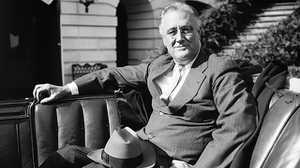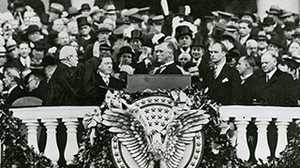Oral Histories
Sample some questions and answers collected by the Works Progress Administration's Federal Writers Project as part of the New Deal employment programs.
Interviewee: Mrs. Mayme Reese
Birth: Born in Charleston, South Carolina, in 1881
Ethnicity: African-American
Family: Two married sons, one single son and one married daughter
Occupation: Housewife
Location: 1 St. Nicholas Terrace, New York City
Date: September 20, 1938
Interviewer: Dorothy West
Interview Excerpt: "What kinds of things did you used to do when you got together with other women?"
Did you ever hear about quilting parties? We used to have quilting parties at least twice a year. One time we would meet at one house and one time at another; you'd keep on that way until the quilt was finished...
"In the fall when they had the county fairs, sometimes we'd take our quilts out to fair-grounds for exhibition. Each lady picked out her best quilt -- the prettiest color, the prettiest pattern and the best stitches -- and took it to the fair to try to win the prize. No, it didn't make any difference if your prettiest quilt had been quilted by three or four other people. You see you already had the pattern and you'd already put the pieces together so that much was your own idea.
Excerpt from the Library of Congress, Manuscript Division, WPA Federal Writer's Project Collection, Transcript #25060506.
Interviewee: Chris Thorsten
Birth: 51 years ago, on board a fishing boat moored to a dock in New Orleans
Ethnicity: Scandinavian
Education: No formal education
Occupation: Iron Worker
Location: Union Hall, 84th Street, New York City
Date: January 31, 1938, 1 PM to 3 PM
Interviewer: Arnold Manoff
Interview Excerpt: "Is your job dangerous?"
You ain't an iron worker unless you get killed... Men hurt on all jobs. Take the Washington Bridge, the Triboro Bridge. Plenty of men hurt on those jobs. Two men killed on the Hotel New Yorker. I drove rivets all the way on that job. When I got hurt I was squeezed between a crane and a collar bone broke and all the ribs in my body and three vertebrae. I was laid up for four years.
Excerpt from the Library of Congress, Manuscript Division, WPA Federal Writer's Project Collection, Transcript #22032106.
Interviewee: Mrs. Marie Haggerty
Age: 72 years old
Occupation: Maid
Location: 63 Austin Street, Worcester, Massachusetts
Date: February 20, 1939
Interviewer: Mrs. Emily Moore
Interview Excerpt: "When you worked as a maid, did you mainly do housework?"
But my dear, it wasn't housework I did.. I was a nurse maid or a second girl -- never just an ordinary girl out to service... You got hired by your looks and even if you looked honest, they would test you out. Why, once I was making up a bed, and right beside the bed was a five dollar bill. I knowed nobody dropped that for nuthin', so I didn't know if I should pick it up and tell them, or what, but my face burnt like fire, for I knowed I was gettin' tested.
Excerpt from the Library of Congress, Manuscript Division, WPA Federal Writer's Project Collection, Transcript #15010211.
Interviewee: Name not given
Location: Eddie's Bar, St. Nicholas Avenue near 147th Street, New York City
Date: April 30, 1939, 8:00 PM
Interviewer: Ralph Ellison
Interview Excerpt: "Do you like living in New York City?"
Ahm in New York, but New York ain't in me. You understand? Ahm in New York, but New York ain't in me. What do I mean? Listen. I'm from Jacksonville Florida. Been in New York twenty-five years. I'm a New Yorker! Yuh understand? Naw, naw, yuh don't get me. What do they do; take Lenox Avenue. Take Seventh Avenue; take Sugar Hill! Pimps. Numbers. Cheating those poor people out a whut they got. Shooting, cutting, backbiting, all them things. Yuh see? Yuh see what Ah mean? I'm in New York, but New York ain't in me!"
Excerpt from the Library of Congress, Manuscript Division, WPA Federal Writer's Project Collection, Transcript #21020403.
Interviewee: Alice Caudle
Occupation: Mill Worker
Location: Concord, North Carolina
Date: September 2, 1938
Interviewer: Muriel L. Wolff
Interview Excerpt: "Do you like working in a mill?"
Law, I reckon I was born to work in a mill. I started when I was ten year old and I aim to keep right on jest as long as I'm able. I'd a-heap rather do it than housework... Yessir, when I started down here to plant No. 1, I was so little I had to stand on a box to reach my work. I was a spinner at first, then I learned to spool. When they put in them new winding machines, I asked them to learn me how to work em and they did. If I'd a-been a man no telling how far I'd-a gone.
Excerpt from the Library of Congress, Manuscript Division, WPA Federal Writer's Project Collection, Transcript #28120207.
Interviewee: Anna Novak
Birth: Wisconsin, about 30 years ago
Ethnicity: Polish
Family: Married with two children, boys, ages 10 and 13
Education: 8th grade and one and a half years of high school in St. Hedwig's Orphanage
Occupation: Packing House Worker
Location: Chicago, Illinois
Date: April 25-27, 1939
Interviewer: Betty Burke
Interview Excerpt: "How long have you worked in the stockyards?"
I've had eight years of the yards. It's a lot different now, with the union and all. We used to have to buy the foremen presents, you know. On all the holidays, Christmas, Easter, Holy Week, Good Friday, you'd see the men coming to work with hip pockets bulging and take the foremen off in corners, handing over their half pints... Your job wasn't worth much if you didn't observe the holiday "customs." The women had to bring 'em bottles, just the same as the men. You could get along swell if you let the boss slap you on the behind... I'd rather work any place but in the stockyards just for that reason alone.
Excerpt from the Library of Congress, Manuscript Division, WPA Federal Writer's Project Collection, Transcript #07051009.
Interviewee: Mr. Garavelli
Age: In his fifties
Ethnicity: Italian
Occupation: Stonecutter
Location: Barre, Vermont
Interviewer: John Lynch
Interview Excerpt: "Is the dust bad in the stonesheds?"
It was tough for everybody in the early days. Lots of stonecutters die from the silica. Now they've got new and better equipment; they've all got to use the suctions. It helps a lot; but it ain't perfect. Men still die. You bet your life my kid don't go to work in no stoneshed. Silica, that's what kills them. Everybody who stays in granite, it gets... I don't get so much of it myself. Maybe I'm smart. I don't make so much money, but I don't get so much silica. In my end of the shed there ain't so much dust. I can laugh at the damn granite because it can't touch me. That's me. I ain't got no money, but I ain't got no silica either. My end of the shed don't get so much dust. It's like a knife, you know, that silica. Like a knife in your chest.
Excerpt from the Library of Congress, Manuscript Division, WPA Federal Writer's Project Collection, Transcript #38021309.
Interviewee: Mrs. Elizabeth E. Miller (Grammy Miller)
Age: 90 years old
Ethnicity: Scotch/Yankee
Family: 4 boys, Clarence, John, James, George and 1 daughter who died in infancy
Location: Mountain and Lake View Farm, West Newbury, Vermont
Date: November 4 and 16, 1938
Interviewer: Rebecca M. Halley
Interview Excerpt: "Did you ever have to do work that the men usually did?"
One fall we had a five hundred and fifty pound dressed hog hanging in the yard. The men went off to Wells River to take up another hog they had dressed at the same time and left it hanging there and the caldron kettle half full of water. They aimed to get back and take the hog down to cellar before it froze. It would never do to let pork that was going to be salted freeze. I was all alone with the children and I waited until almost twelve. My husband didn't come and so I took a lantern and a saw and a knife and went out to fetch in that hog... I cut up that hog and loaded it piecemeal onto the sled. The worst part was getting it through the front door, but I managed. I had it all done before my husband got home. He asked who had brought the hog in. I said, 'I did.' He asked who helped and I said, "Alone." I wasn't wasting many words on him. He was struck dumb.
Excerpt from the Library of Congress, Manuscript Division, WPA Federal Writer's Project Collection, Transcript #37130111.






